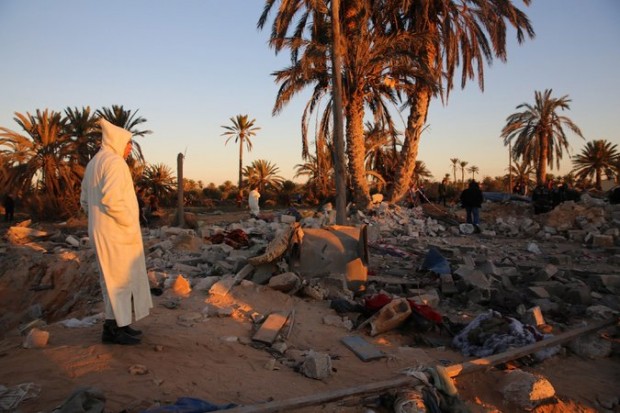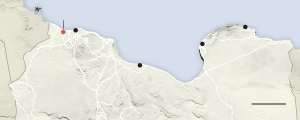The limits of U.S. strategy against IS is shown through bombing IS camp in Libya

American warplanes bombed a seaside town in Libya early Friday aiming to kill a militant commander linked to attacks on Western tourists. But the mission also highlighted the widening gap between American military operations and diplomatic efforts to bring peace and stability to a tumultuous region.
The airstrikes on a training camp in Sabratha, targeting a Tunisian militant associated with planning two major attacks on Western tourists in Tunisialast year, did demonstrate the United States’ growing concern over Libya as a new base for the Islamic State and its willingness to use air power against militant commanders and infrastructure.
Yet every counterterrorism victory also underscores the limits of the American approach to the countries where the Islamic State is strongest, as the focus on military action has not been matched by diplomatic efforts to resolve the core political issues that allow jihadists to prosper.
In Libya, efforts to build a unity government have made little progress. InIraq, there has been little success in easing Sunni resentment. And in Syria, an announced “cessation of hostilities” has not materialized.

Secretary of State John Kerry insists that there are political processes in place in each of those countries, and that progress is possible. But he acknowledges that for different reasons all are quite fragile.
In Syria, the United States military efforts have proved modestly successful in degrading the Islamic State. A combination of American and allied airstrikes, as well as military support for fighters on the ground, has caused the group, also known as ISIS or ISIL, to lose territory. On Friday, American-backed Kurdish-led forces seized the eastern Syrian city of Shadadi, important for its nearby oil and gas fields.
But Friday was also the day that a “cessation of hostilities” announced by the United States, Russia and more than a dozen other countries, was to take effect. Instead, a scheduled meeting of a cease-fire task force was canceled and violence continued across Syria.
The picture is similar in Iraq, where military support by a United States-led coalition has helped Iraqi and Kurdish forces seize territory from the jihadists. But American pressure has failed to push the Shiite-led government in Baghdad to reconcile with the country’s Sunnis in a way that might help reunite the country and defeat the Islamic State.
And in Libya, the United States had thrown its weight behind a United Nations-led initiative to bring the country’s warring factions into a unity government. That process has been plagued by rivalry between Libya’s myriad political and militarized factions, and in the meantime, Western alarm at the dramatic expansion of Islamic State in Libya has grown.
American officials estimate that, with an influx of men from Iraq, Syria and Tunisia, the Islamic State’s forces in the country have swelled to as many as 6,500 fighters, allowing the group to capture a 150-mile stretch of coastline over the past year. It has mounted attacks on the oil facilities that account for most of Libya’s wealth.
“The last thing in the world you want is a false caliphate with access to billions of dollars of oil revenue,” Mr. Kerry warned at a meeting of the 23-nation coalition against the Islamic State on Feb. 2 in Rome.

For weeks, American and allied Western officials have mulled a possible air campaign against the Islamic State in Libya, particularly around its de facto headquarters in Surt. Libyan officials and news media outlets have reported the presence of American, French, British and Italian special forces units in the country in recent weeks, ostensibly on reconnaissance missions and to liaise with local militias.
But American officials stressed that Friday’s strike did not herald the start of such a campaign, and instead was the continuation of targeted strikes that aim to prevent the Islamic State from using Libya as a springboard for attacks in the region or across the Mediterranean Sea in Europe.
One strike last June targeted the Algerian militant Mokhtar Belmokhtar, while another in November killed Abu Nabil, also known as Wissam Najm Abd Zayd al Zubaydi, an Iraqi who led the Islamic State’s arm in Libya.
The Friday strike, on a seaside town 50 miles west of Tripoli, targeted Noureddine Chouchane, a Tunisian militant. He had also helped arrange the arrival of Islamic State recruits into Libya, the Pentagon said in a statement confirming the strikes. Mr. Chouchane, 35, was probably killed in the attack on the compound, where up to 60 militants had been actively training for a terrorist operation, the Pentagon said.
Mr. Chouchane was accused of helping to organize an attack on the National Bardo Museum in Tunis that killed 22 people in March and another in June that killed 38 people at a beachfront resort in Sousse. He is also believed to have helped funnel as many as 1,500 Islamic State fighters to Iraq and Syria.
The Islamic State has continued to push across Libya, underscoring what diplomats say is the importance of settling the multifaceted civil war that has given it space to expand.
Libya’s political leaders are currently divided between two loose political alliances centered on rival Parliaments in the capital, Tripoli, and the eastern city of Tobruk. But the United Nations effort to form a unity government, led by the German diplomat Martin Kobler, has been stymied by the factional differences — based on town, tribe, personality or religious persuasion — that helped set off Libya’s civil war in 2014 and have persistently dogged efforts to resolve it ever since.
An agreement to form a unity government, signed in December, has been loudly opposed by the faction that controls Tripoli, which has refused to allow Mr. Kobler’s plane to even land in the capital since early January. There are tensions over any future role for Gen. Khalifa Hifter, a commander who dominates in the east.
For now at least, the United States seems set on continuing to attack targets of opportunity in Libya while supporting the troubled process led by the United Nations. “We will continue to take actions where we’ve got a clear operation and a clear target in mind,” President Obama told reporters on Tuesday. “At the same time, we’re working diligently with the United Nations to try to get a government in place in Libya. And that’s been a problem.”
Still, the slow-moving political talks are in danger of being overtaken by the pace of Islamic State expansion on the ground.
During an interview in Cairo this week Mr. Kobler, the United Nations envoy, pulled out maps that contrasted the Islamic State’s relatively modest presence in Libya at the beginning of 2015 with its explosive growth 12 months later.
“This is something that can only flourish in a political and security vacuum,” he said. “That’s why something must be done.”
In Syria, civilians have seen few benefits from the diplomacy other than limited deliveries of humanitarian aid.
Analysts warn that the United States cannot hope to defeat the Islamic State without addressing the wider issues that have allowed the group to thrive.
“It is clear that the priority in Washington now is taking whatever steps are convenient to tactically weaken ISIL over the course of the next year,” said Noah Bonsey, a Syria analyst with the International Crisis Group.
The political process to end the war is a lower priority, he said, and has made much less progress.
“If that political track doesn’t go anywhere, it is pretty clear that there is no backup plan,” he said.
How to submit an Op-Ed: Libyan Express accepts opinion articles on a wide range of topics. Submissions may be sent to oped@libyanexpress.com. Please include ‘Op-Ed’ in the subject line.
- North African leaders to hold summit in Libya - October 21, 2024
- Libyan MP predicts dollar tax reduction to 5% by Year-End - October 21, 2024
- Debate over CNN’s reporting reignited on X by Musk - October 21, 2024


